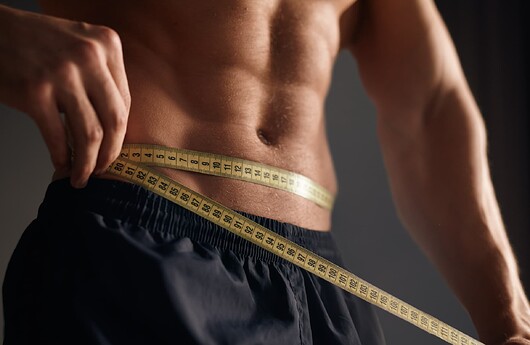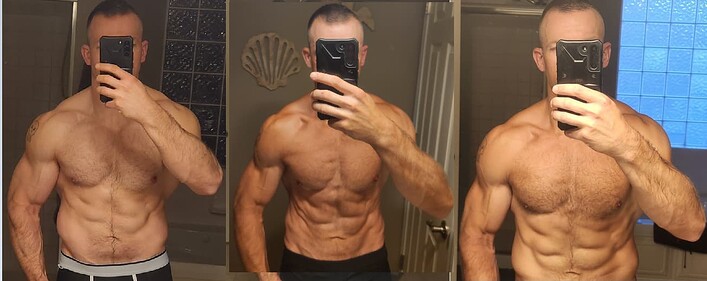I’m sure the topic of whether counting calories is necessary to get good results has been discussed here countless times. The answer is probably a big it depends. For competitive goals that require getting to very low body fat percentages, counting calories is likely essential. But for more modest goals, like those of athletes outside of bodybuilding or most people who train in a gym, you can probably do just fine without it. Some might find calorie counting helpful as a tool, while others could easily skip it. What I wanted to ask is, what do you think are the key factors to focus on when it comes to eating for body recomposition without counting calories or adjusting macros?
I have done a modest “recomp” over the last couple of years, going from 18% BF to 14% BF while keeping my overall weight the same. I don’t count calories, but I don’t think you can get there without counting calories OR adjusting macros. For me, my workouts intensified and I added more high intensity conditioning, but I also increased my protein uptake and decreased my carb intake.
I don’t count or measure, but I have a daily eating routine that gets me to about 175 g protein for day (I weight 170 - 175 lbs). I also mostly cut back on breads, pastas, and minimized beer. I still have these, but am more deliberate about them. If you don’t adjust anything, why would your body recomp itself? You’d be relying solely on changes to your training, but these changes will really only be visibly apparent when coupled with dietary changes.
I competed over three decades in competitive bodybuilding and never counted calories. I used a feedback system, but also you must consider that competed so many times that I knew very well how my body responded to my food intake. Trial and error the first years gave me a good idea what to eat and how much of the macros.
The first diet change is to totally clean up my diet at least 8 weeks out from a contest. I was usually around 15% body fat when I started the cut. I began cutting carbohydrates and tested scale weight and millimeters on the skin fold test calipers, and the mirror. Also, monitoring strength. The goal was to lose millimeters and maintain strength by a slow reduction of carbohydrates.
- If I wasn’t losing mm’s, I cut more carbos.
- If I was losing strength, I added back some carbohydrates.
Simply put: I used Shewhart’s PDCA
Obviously, if you don’t make any changes to your diet, you won’t see any results. But what I was specifically referring to was the use of calorie counting (weighing all your food and calculating the total energy based on calories or macronutrients). Behavioral changes, such as cutting out certain foods, prioritizing others, or similar strategies, are still valid options. What I’m aiming for is to discuss how to manage your diet for effective body recomposition without using calorie counting as a tool.
Ok, I see. Here’s what has worked for me:
Eat similar things at similar times each day. So, I don’t have to count any calories, but ensure I’m meeting my protein needs and prioritizing foods I want to eat. This takes a bit of planning, so you’re not stuck at work with no lunch and hitting up the local dining options. For me, breakfast (after training) is a smoothie with kefir, whey, blueberries, and and honey and is about 60 g protein. Lunch is meat/fish/eggs of some type, berries/fruit, and nuts/seeds. Dinner is larger than lunch, will add greens and rice/potatoes. Snacks would prioritize protein or whole foods, like plain greek yogurt, hardboiled egg, an apple, or similar.
I’ve never counted a calorie in my life, and have totally changed my body on many occasions with that approach. This was me losing 35lbs and gaining back 20 with no calorie counting.
Focusing on food QUALITY is huge when it comes to this approach. It’s very easy to overeat processed junk, because it’s intentionally designed to be unsatiating and nutritionally devoid. It’s quite challenging to overeat just meat, especially if it’s not seasoned.
Even with single ingredient foods, one needs to recognize their unique pitfalls. Cheese is something I’ll consume if I want to gain, and something I’ll limit if I want to lose, because it’s not satiating to me and is VERY energy dense.
Completely slashing carbs has been huge for me. One fewer macro to worry about. When you’re only playing with proteins and fats, it’s MUCH easier to manipulate nutrition.
Eating when HUNGRY and stopping when not is big. If I’m HUNGRY, that means I’ll eat egg whites or chicken breasts. If I don’t “feel like” eating those things, I’m not hungry: I’m bored. In that regard, there’s no snacks. I like Mark Bell’s quote: “Why do you need a snack: are you a child?” I eat meals when it’s time to eat. This means I don’t always eat the same amount of meals every day. Some days more, some days fewer.
No, you don’t have to count calories or macros, unless you need that kind of input for other reasons (like me).
I did well by counting macros. I tried to cut, but really I ended up recomping.
Feb 2022
Weight: 218lbs
Aug 2024
Weight: ~207lbs
Agreed! Also, one thing I’ve noticed is that those who do get ripped counting calories are often the same ones who spend half the year kinda chubby. It’s like they do micromanaged long-term yo-yo diets, but call it bulking and cutting. Not always the case, but I’ve seen it enough to notice a pattern.
Good for them if they enjoy those seasonal swings. I experience them to a lesser extent because cold weather makes me hungry, but I’d rather find a sustainable middle ground that errs on the side of looking conspicuously fit, year round if possible.
It’s such a cool coincidence that you bring this up. I was just thinking about general recommendations this morning because I’ve been visiting loved ones and couldn’t help but notice more patterns: namely, multiple sources of carbs at each meal and minimal protein if any. Like ever.
So my 10 biggest bits of wisdom would revolve around those, plus a few others:
- Make protein the main part of every meal.
- If you must have a carb source at a meal, just pick one. Dinner rolls aren’t necessary if you’re eating pasta. And neither of those are necessary if you’re planning to have dessert.
- Eat cheese, nuts, salad dressings, and the like sparingly or mindfully, if at all.
- Don’t fast if you know it causes binges.
- Be able to decipher between physical hunger and everything else, like cravings or filling an emotional need.
- Don’t eat when you’re upset, mad, anxious, etc.
- Allow yourself to experience true hunger on occasion. Life happens, you shouldn’t need to eat the trash pretzels they serve on airplanes.
- Learn to cook so you can strategically emphasize macros and limit sneaky calories from restaurant cooking oils.
- Marry a hottie who cares about body composition.
- Satisfy your sweet tooth with protein. This is where protein powders come in. It’s an advantage and I feel sorry for those who have a sweet tooth and can only satisfy it with conventional desserts.
Note: some people can improve their body comp without following all of this, but these are just what work for me. Number 6 was the hardest to learn and it made the biggest impact as a former emotional eater.
This is the most excellent list. Also, if you can help me out with #9, I am not above a set-up. lol
Oh really? You have to come visit now!
I will seriously be on the lookout!!! ![]()
You really need to figure out your TEE to get a caloric baseline. I started back in the gym May 2, after a 20 month layoff. I weighed 187 at 18.6% body fat (BIA scan). I’m 5’10”. I use mostly John Meadows’ training principles and a little bit of Stuart McRobert’s stuff. I do a 14:10 IF and carb / calorie cycling diet. Approximately 10% more carbs and calories on my training days and 10% less on non-training days. I also adhere to 90/10 and eat mostly clean nutrient dense food. Weights 3 x a week, cardio 3 x a week. Well I can tell you muscle memory and Mountaindog training principles are a great thing ! On August 4, I weighed 213 at 15.4% body fat. No AAS, no SARMs. After the first few weeks of eating and tracking calories via an app (I use MyFitnessPal) you kinda know what and how much you should be eating each meal/day. Peri-nutrition is huge !
Id love to see a picture of that ![]()
Blockquote
I think there are some semantics at play over counting calories and judiciously logging them.
You can’t recomp, gain or lose weight without the right calorie balance.
If you’re still learning your way around food, logging and literally counting is all but necessary. With experience estimating serves as “counting”, but you can’t do anything without proper caloric manipulation.
I remember a famous guitarist was once asked how he got to his level and he replied “Learn everything, then forget it all.”
Beginners need to count/log, but when that is internalized, you know what the rules are, and how to break them for you.
I am eating when hungry and stopping when not, vs estimating how much food is on my plate before devouring it all. Where does that fall in the spectrum?
You and I don’t figure in on this thread. We know our body too well. So, simply put you are nowhere on the spectrum.
Estimating. You’re using your hunger to determine volume. You also carefully select foods by specific nutrient content based on a few posts I’ve read, and this factors in to a controlled intake.
But I’m specifically stopping when I get unhungry. I’m not eating beyond the hunger or less than the hunger.
And since hunger isn’t a fixed variable, and I’m not eating fixed amounts at fixed times, I’m unsure how this would work in a plane of estimation.
Estimation is a rough calculation of the value, quantity, number or extent of something.
You select and reject specific foods to allow for the intake you want while letting hunger literally guide your estimation of “enough”.
You are very literally estimating. Based on knowledge, via experience.



